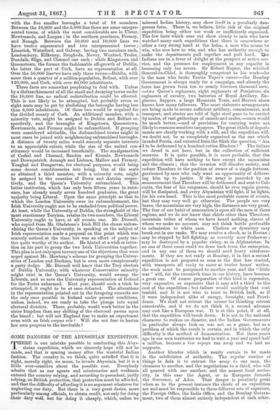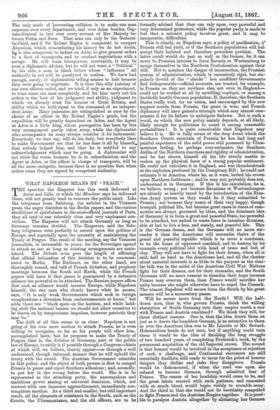.60ME DANGERS OF THE ABYSSINIAN EXPEDITION.
rpnERE is one mistake possible in conducting this Abys-
sinian expedition, which we sincerely hope will not be made, and that is sparing money after the wasteful Indian 'fashion.: The country is, we think, quite satisfied that it is Tight, morally right, we mean, to invade Abyssinia, but it is a little over-sensitive about the possible cost. Everybody
• admits that as our agents and missionaries and workmen entered the country relying, and according to precedent, justly relying, on British protection, that protection must be afforded, and that the difficulty of affording it is no argument whatever for neglecting our duty. But there is a very great desire, more particularly among officials, to obtain credit, not only for doing their ,daty -well, but for doing it cheaply, which, unless we misread Indian history, may show itself in a peculiarly dan- gerous form. There is, we believe, little risk of the original expedition being either too weak or inefficiently organized. The few facts which ooze out show clearly to men who have watched many such expeditions that there is somewhere or other a very strong hand at the helm, a man who means to win, who sees how to win, and who has authority enough to make the departments pull together and pull hard. Tie Indians are in .a fever of delight at the prospect of active ser- vice, and the pressure for employment in any capacity is becoming only too severe. Sir Robert Napier, the selected General-in-Chief, is thoroughly competent to his work—he is the man who broke Tan tia Topee's career—the Bombay Government is always ready for a campaign, and already the force has grown froni ten to nearly fourteen thousand men, —two Queen's regiments, eight regiments of Punjabees, six regiments of cavalry, two batteries of Royal Artillery, En- gineers, Sappers, a large Mountain Train, and Heaven alone knows how many followers. The most elaborate arrangements are being made to secure sufficient artillery, commissariat, and transport, and stories are told of light steel guns to be carried. by mules, of vast gatherings of camels and mules,—oxen would be much better,—and of provisions for carrying water not likely to reassure sensitive taxpayers. The great chiefs of depart- ments are clearly working with a will, and the expedition will, we doubt not, be as completely organized as the one which invaded Persia, and extorted from the Shah the question, "Am Ito be dethroned by a hundred rotten Hindoos ? " The failure we dread is not here, but in the collection of sufficient reserves. It is quite possible, it is most probable, that the expedition will have nothing to face except the mountains and the climate ; that the invasion will dissolve society, and reduce Theodore to the position of owner of a single fortress, garrisoned by men who only want an opportunity of deliver- ing him up to justice. If the army is preceded by an announcement that Theodore will be dethroned and sent to Cal- cutta, the fear of his vengeance, should he ever regain power, will be dissipated, and every Abyssinian will fight, if he fights. for his own hand. This is the most probable course of events, but they may very well go otherwise. The people are very brave, the mountains are very high, the distances are very great. The fear of our habit of annexation is upon all the men of these regions, and we do not know that chiefs other than Theodore, mountain tribes of whom we have heard nothing, classes of whom we make no account, may not think battle preferable to submission to white men. Cholera or dysentery may break out in our ranks. We may receive a check, as in Bootan ; may be stopped by hill fighting, as recently near Peshawur ; may be destroyed by a popular rising, as in Afghanistan. In no one of these cases could we draw back from the enterprise, and in any one of them we should need heavy reinforce- ments. If they are not ready at Bombay, if in fact a second. expedition is not prepared as soon as the first has started, with transports all ready to move at twelve hours' notice, the work must be postponed to another year, and the " little war " will, for the twentieth time in our history, have become a great one. Of course preparation of this kind is expensive, very expensive, so expensive that it may add a third to the cost of the expedition ; but failure would multiply that cost tenfold, and it is not wise to trust to British luck, as if it were independent alike of energy, foresight; and Provi- dence. We shall not retreat the sooner for thinking retreat conceivable, and if we do not think it, a second advance may cost like a European war. It is at this point, if at all, that the expedition will break down. It is not in the national character to reckon on disaster, and the Indian Governments in particalar always look on war not as a game, but as a problem of which the result is certain, and in which the only difficulty is the method of demonstration. Not three years ago in our own territories we had to wait a year and spend half a million, because a few sepoys ran away and we had no supports.
Another blunder which is nearly certain to be made is the subdivision of authority. The regular routine of
things in Asia is to entrust the army to one man, the steamers to another, and the negotiations to a third, who will all quarrel with one another, and the nearest local autho- rity, in this case the Agent, or in European formula the Governor, of Aden. That danger is peculiarly great when as in the present instance the chiefs of an expedition are and must be responsible to three different sets of superiors, the Foreign Office, the India Office, and the Bombay Govern- ment, two of them almost entirely independent of each other.
The only mode of preventing collision is to make one man supreme over every department, and over Aden besides, Cap- tain-General in fact over every servant of Her Majesty be- tween Perim and Suez. That man can only be the General- in-Chief, and if Sir Robert Napier is competent to conquer Abyssinia, which remembering his history we do not doubt, hg is also competent to indent on Aden, to give general orders to a fleet of transports, and to conduct negotiations with a savage. He will want interpreters, secretaries, it may be even a diplomatic adviser, but he will not want a " Political " by his side, a man in black before whose " influence " all authority in red will be paralyzed or useless. We have had enough, surely, of diplomatists telling armies to halt because they were going to negotiate. It is time this silly jealousy of our own officers ended, and we tried, if only as an experiment, to trust some one man completely, and let him carry out his orders to the best of his judgment and ability, judgment to which we already trust the honour of Great Britain, and ability which we hold equal to the command of an indepen- dent army Many jealousies are extinguished at once by the choice of an officer in Sir Robert Napier's grade, but the expedition will be greatly dependent on Aden, and the Agent at Aden is a little king, whose prerogative has been by this very arrangement partly taken away, while the diplomatist who accompanies an army always consider it his instrument. Everybody, we dare say, will do his duty, but everybody likes to make Government see that he has done it all by himself. that nobody helped him, and that he is entitled to any acknowledgments which may be going. A diplomatist will not write the worse because he is in subordination, and the Agent at Aden, or the officer in charge of transports, will be all the more energetic, because there is no question that when orders come they are signed by competent authority.































 Previous page
Previous page